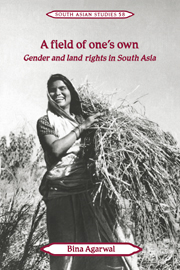Book contents
- Frontmatter
- Contents
- List of illustrations
- List of tables
- Preface
- Map 1.1 South Asia: provincial/state divisions
- 1 Land rights for women: making the case
- 2 Conceptualizing gender relations
- 3 Customary rights and associated practices
- 4 Erosion and disinheritance: traditionally matrilineal and bilateral communities
- 5 Contemporary laws: contestation and content
- 6 Whose share? Who claims? The gap between law and practice
- 7 Whose land? Who commands? The gap between ownership and control
- 8 Tracing cross-regional diversities
- 9 Struggles over resources, struggles over meanings
- 10 The long march ahead
- Definitions
- Glossary
- References
- Index
- Cambridge South Asian Studies
3 - Customary rights and associated practices
Published online by Cambridge University Press: 14 January 2010
- Frontmatter
- Contents
- List of illustrations
- List of tables
- Preface
- Map 1.1 South Asia: provincial/state divisions
- 1 Land rights for women: making the case
- 2 Conceptualizing gender relations
- 3 Customary rights and associated practices
- 4 Erosion and disinheritance: traditionally matrilineal and bilateral communities
- 5 Contemporary laws: contestation and content
- 6 Whose share? Who claims? The gap between law and practice
- 7 Whose land? Who commands? The gap between ownership and control
- 8 Tracing cross-regional diversities
- 9 Struggles over resources, struggles over meanings
- 10 The long march ahead
- Definitions
- Glossary
- References
- Index
- Cambridge South Asian Studies
Summary
The natives of Ceylon are more continent with respect to women, than the other Asiatic nations; and their women are treated with much more attention. A Ceylonese woman almost never experiences the treatment of a slave, but is looked upon by her husband, more after the European manner, as a wife and a companion.
(Percival 1803: 176)[I]f she is weary of a man, she tells him to go, and he does so, or makes terms with her. Any children they may have stay with the mother who has to bring them up, for they hold them not to be children of any man, even if they bear his likeness, and they do not consider them their children, nor are they heirs to their estates …
(Barbosa c. 1518, on the Nayars, translated from the Portuguese by Dames 1921:42)Prior to colonial rule, the inheritance of property, including land, was governed by local customs in South Asia. These customs varied by region, religion, caste, and sometimes even family, forming a complex mosaic. But to what extent did they give women inheritance rights in land? Did such rights, where they existed, make for greater equality in gender relations, as suggested by the above quotations on the bilateral Sinhalese and matrilineal Nayars? And were these rights structurally linked to (or conditional upon) certain social practices?
- Type
- Chapter
- Information
- A Field of One's OwnGender and Land Rights in South Asia, pp. 82 - 152Publisher: Cambridge University PressPrint publication year: 1995

